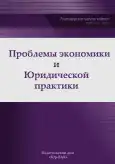Mechanisms and Countermeasures for Structural Changes in Global Value Chains Affecting China's Economic Security
- Authors: Zhang Y.1
-
Affiliations:
- Institute of Business of the Belarusian State University
- Issue: Vol 19, No 3 (2023)
- Pages: 236-241
- Section: Regional and Sectoral Economics
- URL: https://journal-vniispk.ru/2541-8025/article/view/145631
- EDN: https://elibrary.ru/CBYILU
- ID: 145631
Cite item
Abstract
The purpose of the study is to analyze structural changes in the global value chains of the People's Republic of China and develop mechanisms and countermeasures aimed at increasing the level of China's economic security in the face of the sanctions impact on the Russian economy. The article reveals the essence of the concepts of «value chains», «economic security», «economic mechanism» and «countermeasures», identifies the factors of structural transformation of China's value chains that impede the stability of functioning and reduce the competitiveness of Chinese enterprises in the context of the sanctions impact on the Russian Federation. An analysis was made of changes in the foreign trade activities of the People's Republic of China and the Russian Federation associated with the transformation of resource-intensive production and direct supply and marketing channels. The mechanisms and countermeasures designed to stabilize structural changes in China's global value chains and developed taking into account modern trends in the development of world economic relations based on the accumulated experience and strategies of other countries with transitive economies, which will contribute to the strategic development of the PRC economy and strengthen the economic security of the state, are presented. by ensuring the maximization of their own benefit in the integration processes associated with international production and international trade.
Full Text
##article.viewOnOriginalSite##About the authors
Yuelong Zhang
Institute of Business of the Belarusian State University
Author for correspondence.
Email: bsuzhang@gmail.com
Graduate student
Belarus, MinskReferences
- Bakulina P. V., Kuzmina K. A. Policy of Economic Sanctions of China: Legal Regulation and Law Enforcement Practice // Financial Journal. —2021. —T. 13. —No. 4. —p. 24–38.
- Voronova S.M., Ordynskaya O.N. Sanctions and their impact on the activities of Russian enterprises Theory and practice of service: economics, social sphere, technology. —2022. —No. 4 (54). —P. 27–32.
- Gureeva M.A. Economic security of the state. Countering the spectrum of threats—from material to information and digital / Moscow —2021. (2nd edition) —341 p.
- Drobot E.V. The ascending role of regional value chains in the conditions of the functioning of the African Continental Free Trade Area in the post-pandemic period // Economic relations. —2022. —Volume 12. —No. 4. —P. 867–898.
- Drobot E.V. New world economic order in the post-pandemic period: rivalry between China and the USA // Economic relations. —2022. —No. 1. —p. 51–68.
- Izmalkov S., Sonin K., Yudkevich M. Theory of economic mechanisms // Questions of Economics. —2020. —No. 1. —P. 4–26.
- Kazantseva E. G., Lyamkin I. I. Influence of supply chains on food security // Technique and technology of food production. —2022. —V . 52.—No. 2. —P. 282–295.
- Kang Wei, Jiang Bao. Analysis of the connotations, challenges and countermeasures of the digital economy//Wei Kang, Bao Jiang//Journal of China University of Electronic Science and Technology. —2018. —No. 5. —P. 12–18.
- Kireeva N.S., Zavyalov D.V., Zavyalova N.B., Saginova O.V. Transformation of the economy in the context of the COVID-19 pandemic // Economics, Entrepreneurship and Law. —2021. —No. 2. —p. 213–226.
- Kirienko N.V. A New Configuration of Global Value Chains in the Agri-Food Market Belarusian Economic Journal. —2022. —No. 1. —P. 62–78.
- Korabeinikov I.N., Borisyuk N.K., Smotrina O.S. Inclusive development of the economy during the «coronavirus» period of the pandemic // Economics, Entrepreneurship and Law. —2021. —No. 1. —p. 11–26.
- Lee Yonghui. Construction of the economic corridor China-Russia-Mongolia in the context of the global epidemic // World of Russian-speaking countries. —2020. —No. 4 (6). —P. 27–54.
- Xi Jinping delivered a speech at a meeting marking the 75th anniversary of the victory in the resistance war against the Japanese invaders 座谈会上发表重要讲话) // Government website China. —2023: [website].—URL: http://www.gov.cn/xinwen/2020-09/03/content_5540176.htm. (date of access: 04/27/2023)/
- Ushkalova D.I. Russia's foreign trade under sanctions pressure // Journal of the New Economic Association. —2022. —No. 3 (55). —P. 218–226. doi: 10.31737/2221-2264-2022-55-3-14.
- Huang Renwei. Belt and Road Initiative Faces New Challenges, New Opportunities, Global Times, May 26, 2022. 黄仁伟:一带一路”面临新挑战和新机遇,环球时报,2022年 5月 26日.
Supplementary files









